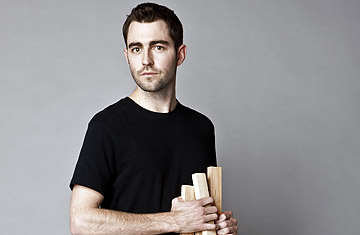
Turned around. Rattray was headed for Wall Street until and epiphany led him to start Change.org
Exactly a month after Trayvon Martin's death, 3,000 people in Sanford, Fla., marched on the town's civic center and demanded justice for the slain teenager — and punishment for the man who shot him. At the end of the hour-long march, Martin's parents Sybrina Fulton and Tracy Martin spoke of their grief for their son and their anger that George Zimmerman, the neighborhood-watch volunteer who had shot him, was still a free man. The hall filled with loud shouts and amens and fierce cries for justice that drowned out even the family's and lawyers' speeches.
The march was the climax of a weeklong campaign to bring attention to Martin's death, with a measure of its impact contained in 10 cardboard boxes that the marchers took to the Sanford city council. The boxes contained the names of 1.5 million people who had signed a petition at the website Change.org calling for Zimmerman's prosecution. The signature drive helped turn Martin's death into a national gut check — one that, amplified by growing media coverage, preoccupied broadcast news and the blogosphere until even President Obama offered an opinion. For Ben Rattray, Change.org's founder, the campaign was the most recent and spectacular demonstration of the way ordinary folks can now mobilize extraordinary support for their causes. "Trayvon's parents know they are no longer alone in demanding justice for their son," he says. "We have the platform to facilitate people power in a way nobody's seen before."
If the Facebook-enabled Arab Spring and the Twitter-happy Occupy movement have hogged the headlines recently, Rattray's site has quietly enabled tens of thousands of people, many with little exposure to social activism, to launch homegrown crusades on issues ranging from corporate malpractice to immigration reform without ever gathering in a park or square. By marrying one of the world's oldest organizing tools, the petition, to one of its newest, the social-media loop, Change.org is putting companies and governments under tremendous pressure to change their policies, sometimes in a matter of a few weeks or less. And it has invited everyone around the globe to participate. "Before, to be an activist you had to go on a march," says Hayagreeva Rao, professor of organizational behavior and human resources at Stanford University. "Now all you need to do is log on."
In less than five years, Rattray's website has built a membership of 10 million — three times the roster of Amnesty International or People for the Ethical Treatment of Animals. Two million members live outside the U.S. More than 93,000 petitions have been launched on the site, and Change.org claims over 1,000 victories, a number growing at the rate of about one a day. Rattray's goal: to make Change.org synonymous with activism in the way Amazon is with books.
The Trayvon Martin petition didn't go viral overnight. It was launched by a Howard University law student 11 days after the teenager's death. It quickly caught the attention of Jon Perri, a Change.org staffer who reckoned the petition would be more persuasive if it came from Martin's parents. So Perri contacted their attorneys to see if they would consider it. Once Fulton and Martin agreed to make it their own, it was given a new, hard-to-ignore name: "Prosecute the killer of our son, 17-year-old Trayvon Martin."
Support for the petition surged. Soon the case was drawing attention from the media, which led even more people to sign the petition. It went from 500,000 signatures to a million in less than three days and to 2 million in four more. At the peak of the drive, on March 22, the petition was getting 300 signatures a minute. Martin's parents were stunned by the response. In San Francisco, Change.org's engineers worked nights, concerned that the spike in interest could crash the site. "People begin to sense that their signature can have a real material impact," says Rattray. Obama's comment — the President mused that if he had a son, he would look like Martin — heightened that perception.
